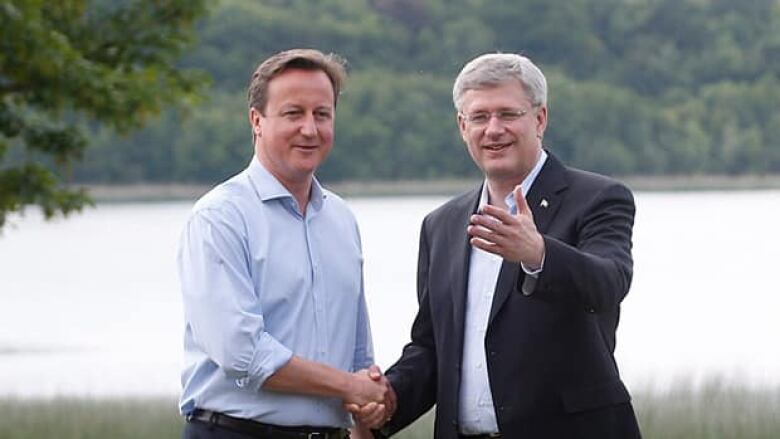Leaders downplay reports of stalled Canada-EU trade talks
EU spokesperson suggests Canada not showing enough 'pragmatism and flexibility'

Both Prime Minister Stephen Harper and his British counterpart, David Cameron, downplayed signs of trouble in the Canada-EU trade negotiations Tuesday, even as the European Union's spokesman suggested Canada hasn't shown enough "pragmatism and flexibility" at the table.
On Monday at the G8 talks in Northern Ireland, theEU and the U.S. announced the start of their own bilateral trade negotiations, even though the EU'snegotiations with Canada aren't finished yet.
"It's interesting," Harper told reporters at the summit Tuesday."I think in terms of the global trading system[the start of the U.S. talks]is a positive thing.
"In terms of our own negotiations, I think you could say maybe there are some advantages, maybe there are some disadvantages. But I don't think it changes the fundamental calculus, which is we should stay at the table until we get a deal that is in the bestinterests of Canadians.
"We're not quite there, but we continue to make progress and we continue to be committed to progress," the Canadian prime minister said.
'Not enough flexibility': Cameron
His British counterpart did hint at signs of a stalemate, but maintained the positive outlook both leaders showed towards the talkswhen Harper addressed the British Parliament last weekand said the deal "remains our hope."
"The negotiations as I can see it have been going well. I think they are really nearly over.There just wasn't enough flexibility right here in Lough Erne to do the final deal," Cameron said.
"There really are just a couple of remaining issues that I think the European Commission and the Canadianteam sitting down with all the information at their fingertips, all the flexibilities they need with member states in the European Union and of coursethe provinces in Canada, [if they] have one more go and it will be there," Cameron added.
"It wasn't possible to do it right here and that's a pity. But the pressure of this G8 I think really got through a lot of the final issues. It's now down to the last few yards and I'm sure that it will be done."
Cameronrejected a reporter's suggestion that the Canadian dealcould be "sideswiped" by the American talks.
"I would think that it's in everyone's interest to get this one done and dusted before other things start kicking off," the British prime minister said.
Which side is to blame?
A report in the Globe and Mail newspaper Tuesday suggested that the talks were unravelling because competing directorates in the EU were fighting each other, particularlyduring talks on opening trade in services.
The newspaperquoted an anonymous Canadian source saying "the EU side seems increasingly incapable of getting its act together to close a deal," making "erratic moves such as backing away from earlier commitments."
The sourcesaid the EU's actions were "on the verge of bad faith."
EU spokesman John Clancy issued a statement to the Canadian media Tuesday that fired back.
"The EU has shown pragmatism and flexibility and is ready to take the last steps to achieve a political breakthrough in the negotiations," Clancy's statement read.
"We have been awaiting a similar message fromCanadasince the trade and agriculture ministers met inOttawain early February."
The negotiations towards the Comprehensive Economic Trade Agreement (CETA)have beenclosed proceedingsinvolvingmostly tight-lipped negotiators. Only occasionally has the public messaging on the talks veered off-course from a set of standard talking points about the potential benefits of increased trade.
A fewdraft negotiating positions have been leaked, and the EU ambassador to Canadatold reportersin May thatCanada's position on agriculture would be "suicidal" for European beef farmers.
Earlier this month, Newfoundland and Labrador Premier Kathy Dunderdale suggested the federal government wastrying to strongarm her into capitulatingon her province's position on minimum processing requirements for fish.
The Canadian negotiating team is said to be prepared to remain at the tableall summer if that's what it takes, despite reported frustration over the EUfailing to show movement on key files and reopening parts of the deal thought to have been closed.
Adam Taylor, a spokesman for International Trade Minister Ed Fast, told CBC News that "Canada has made robust offers in good faith that address the EUs key interests. Canadians expect to be provided the same by the EU. We continue to make this clear to our EU counterparts."












_(720p).jpg)


 OFFICIAL HD MUSIC VIDEO.jpg)
.jpg)



























































































